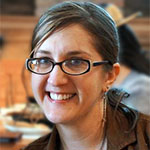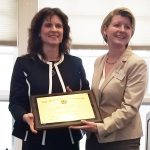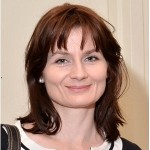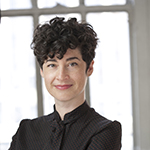

Professor Rebecca Puhl and Assistant Professor Ryan Watson‘s study with the Human Rights Campaign was recently covered in the Washington Post & the Boston Globe, among other outlets.


Professor Rebecca Puhl and Assistant Professor Ryan Watson‘s study with the Human Rights Campaign was recently covered in the Washington Post & the Boston Globe, among other outlets.




The College of Liberal Arts and Sciences (CLAS) acknowledged four HDFS faculty who received tenure this year: Dr. Alaina Brenick, Dr. Linda Halgunseth (both were promoted to Associate Professor), Dr. Marlene Schwartz, and Dr. Rebecca Puhl.

Associate Professor Laura Donorfio received the 2018-2019 University Teaching Fellows Award from the Center for Excellence in Teaching and Learning. Laura will be partnering with CETL over the course of the next academic year on workshops and events through CETL.
Laura is also the recipient of the 2018 College of Liberal Arts and Sciences (CLAS) Excellence in Teaching Award in Behavioral and Life Sciences.
Laura is an exceptional instructor, highly dedicated to the education of our students, particularly in Waterbury, not only through her classroom instruction, but through the many other advising and enrichment opportunities that she provides to students. In the words of one of her colleagues, Laura “engages students that most professors underestimate, and she inspires student learning to a level most teachers never reach.” And in the words of one of her former students, “I look up to Dr. Donorfio for her caring nature, her work ethic, and her contribution to UConn and HDFS. I highly encourage all of my friends and peers at UConn to take her classes because I have learned more from Dr. Donorfio than any syllabus and class description could ever suggest. She taught us how to be responsible, hardworking, free-thinking, and open-minded members of society and individuals.”
 Professor Steven Wisensale’s article on Baseball Diplomacy and Japan-U.S. Relations published on UConn Today.
Professor Steven Wisensale’s article on Baseball Diplomacy and Japan-U.S. Relations published on UConn Today.
 Professor Michael Ego’s article on his work with people with dementia was published in The Conversation.
Professor Michael Ego’s article on his work with people with dementia was published in The Conversation.



Assistant Professor Alaina Brenick, Associate Profesor Annamaria Csizmadia, and Assistant Professor Linda Halgunseth presented at the CLAS Diversity Research Poster Session.
 AAUP’s feature of Associate Professor Laura Donorfio, highlights her work with students and with the Osher Lifelong Learning Institute (OLLI). The AAUP features UConn faculty as part of an ongoing effort to educate legislators (and others) on what UConn faculty do and the impact we have outside of the classroom.
AAUP’s feature of Associate Professor Laura Donorfio, highlights her work with students and with the Osher Lifelong Learning Institute (OLLI). The AAUP features UConn faculty as part of an ongoing effort to educate legislators (and others) on what UConn faculty do and the impact we have outside of the classroom.
 See this recent article about Emeritus Professor Ronald Rohner by the AAUP.
See this recent article about Emeritus Professor Ronald Rohner by the AAUP.
 See the following news coverage in the Pacific Standard on Laura Mauldin’s book, Made to Hear.
See the following news coverage in the Pacific Standard on Laura Mauldin’s book, Made to Hear.